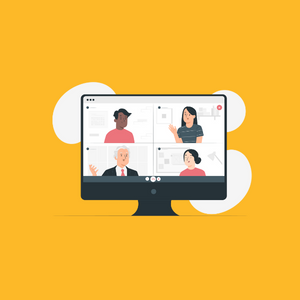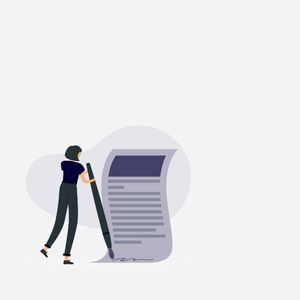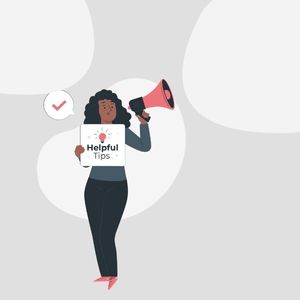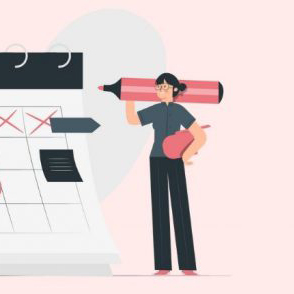Now that the vaccine is being distributed across the world, we can start to expect a potential return to normality on the horizon. For working parents, the transition back to school starts off with so much promise: a break from kids shrieking at an ear-splitting pitch or jumping on the sofa as if they are on a trampoline.
Although schools have mostly re-opened in the Netherlands, many working parents still need to cope with kids at home until daycares and after-school programs begin running again.
After months of COVID-19 lockdown, it seems like working parents are getting the hang of juggling their work with their kids hovering about. However, it never hurts to revisit some useful tips to overcome the daunting reality of a hectic work-family–life situation.
These useful tips are documented by our Recruitment Consultant – Fariha Samad, who has a fair share of challenges remaining productive and a patient parent with 2 kids at home (2 years and 6 years old).
Have a daily routine and schedule
By maintaining a routine, you are setting clear expectations about what tasks need to be done for the day. Kids thrive on routine and it helps them keep their world in order. Having a full-day routine keeps the kids occupied and they experience some sense of normalcy in their lives.
Having a timetable creates healthy and constructive habits for your children. For school-aged kids, you can reach out to their teachers and ask them to set up a timetable for school hours. Making them follow the timetable would maintain orderliness in their lives as well as keep up the enthusiasm for home learning. They would also notice their playtime after school, which will deflect their energy away from you.
For pre-schoolers, their naps and meals schedule should stick to the same hour every day. To minimize the interruptions, their nap times should be maximized so you can focus on your work as much as possible.
Keep your schedule flexible
It’s unrealistic (and downright impossible) to perfectly plan your daily routine and schedule when you have kids with school activities, or a baby without a sleep schedule. You’ll need to reshuffle your day around your kids’ schedules – such as waking-up 2–3 hours before everyone else does at home or work a few hours after the kids go to bed in the evening.
Expectations with your manager and teammates should as well be managed. You should be realistic about what you can and cannot achieve, given the circumstances, and be upfront about the kind of help and support you will need from your co-workers. Flexibility at work is extremely important to be more productive with the time you have and help you balance parenting and working easier.
Furthermore, what type of flexibility is feasible will depend on the characteristics of your job. As a recruiter, Fariha schedules her calls in time ranges instead of exact times whenever possible. “For example, I tell my candidates that I will call them between 1:00 PM and 1:30 PM instead of fixing a time of 1:00 PM. This helps me engage my kids in an activity before I make the phone call. If this is not in your control, then try to engage your kids in an activity 5–7 minutes before your call starts.”
Take breaks regularly
Breaks are an essential part of any job to help you avoid burnout. Spending some time with the family is a good way to de-stress yourself. Fariha recommends frequent, light “exercise breaks” which are a great way to engage the kids and help you stay active.
“What I would suggest is to follow a family exercise routine on YouTube. We do the Leslie Sansone walking exercise program, which the whole family can do together as a refresher during the afternoon energy slump. It takes around 10–12 minutes.”.
Reach out to family and friends for help
If you live in a two-working-parent household, it is important to discuss how can you support one another and ensure that the kids, household, and your professional work gets done. “They can help with home-schooling or putting kids to bed. You can pre-decide which hours they will take over depending on what times you have meetings during the day. Or you can decide to work in shifts during the day.” she adds.
Video calls with grandparents, aunties, or any other relatives who can keep your kids engaged will also give you a breather. In addition, a group video call with their school friends can also keep them busy for a long time.
Be forgiving!
Your kids are also going through a hard time since their normal routines have been completely changed. They will react by disobedience and being difficult in general, as their freedom is also taken away. As parents, you have to support them emotionally. To do so, you can spend the evenings and the weekends with some quality family time. You can also do this by playing board games or watching a movie together.
You also need to be forgiving to yourself. Day-to-day, things will go wrong, and mistakes will be made. But as long as you’re doing the best you can, everything will be fine. Take time for self-care, exercise, and eating well, otherwise, you will burn out quickly. Remember this is a temporary situation and there are better days ahead.
Final word from Fariha
Being a working-from-home parent is an intense but survivable experience. But we all know that this time will pass, and we will be surprised and impressed with how we managed to do it all. With a bit of planning and open communication with your partner, your children, and your team, you’ll be able to keep the good times at home rolling: despite the pandemic.
Octagon Professionals offers expert advice on managing your teams remotely, read our tips here or contact us for more information on remote working.

Dutch COVID-19 Business Relief Measures (NOW)(UPDATE 2022)
14-02-22
It’s been nearly 2 years since the Dutch government first implemented the Temporary Emergency Measures Bridging Employment package (also known as ‘NOW’) to help businesses retain their employees during COVID-19. There have been several updates to these measures since it ...

5 common pitfalls to avoid during remote onboarding
03-02-22
After being forced to work exclusively from home for a period, surveys show that over 97% of workers would like to work remotely (at least some of the time) for the rest of their career. To address these employee expectations, ...

Average Salaries In The Netherlands
28-01-22
Talent makes all the difference when it comes to the success of your business – especially in a foreign market. In order to attract (and retain) the talent you need to grow your business, it is important to understand the ...

New laws for businesses and Expats that come into effect in 2022
14-01-22
Between Prinjesdag and the New Year, the Dutch parliament is working to implement hundreds of new laws, regulations, updates to current laws/regulations, etc. Understandably, the majority of news around these topics are communicated in Dutch. This year, we looked through ...

How to attract (the right) talent in 2022
17-12-21
It’s no secret that the last 2 years have completely turned job markets around the world on their heads. Between the pandemic, “antiwork” movement, and growing “job-hopping” trends – businesses need to revaluate their value as an employer going into ...

The fundamentals of employee event planning for 2022
04-11-21
Company events are the tried-and-true method of facilitating teambuilding and engagement for employees. Just like any good party, a company event breaks the ice between co-workers and creates camaraderie by celebrating the success of your company. The reasons you want ...

Apply for unemployment benefits in the Netherlands (WW-uitkering): Step-by-step
21-10-21
Nearly every worker in the Netherlands is entitled to financial support from the Dutch Unemployment agency (UWV) in the event of unexpected job loss. If you are dismissed from your job in the Netherlands, you can apply to receive unemployment ...

How to develop an attractive relocation package in the Netherlands
15-10-21
Any employee knows that traveling or relocating to other countries for business is no simple matter. In addition to the pressure and deadlines at work, many aspects of daily life need to be dealt with, which could be physically and ...
